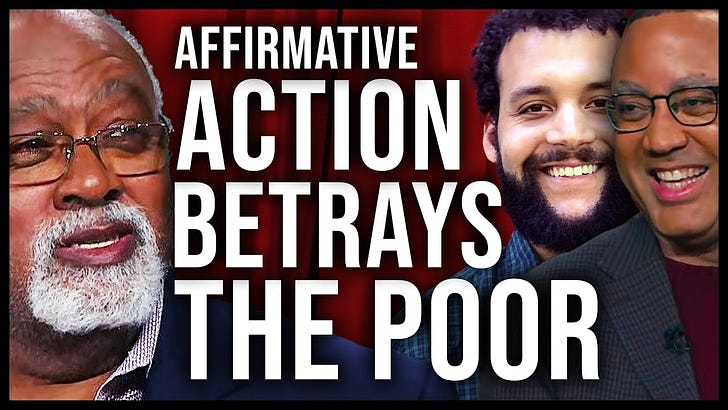On this week’s episode, John and I are joined by Tyler Austin Harper, assistant professor of environmental studies at Bates College. Recently, Tyler has published a couple of pieces on race and affirmative action that caught our attention, because they seemed, well, pretty reasonable. It’s refreshing to hear his critiques of current affirmative action practices and poisonous white “antiracism” coming from a black progressive college professor, even if he does have three names (I kid).
We begin by asking Tyler to explain his concept of “racial gamification” in college admissions, which incentivize students to calibrate their racial self-presentation in dubious ways. He sees this as a violation of the spirit of affirmative action, as it does more for wealthy students than it does for the underprivileged. But as he sees it (and John concurs), more people share our skepticism than progressive black elites would have you believe. Tyler is also a believer in colorblindness, at least at the interpersonal level. He notes that some of his white peers who are overly anxious about their own implicit biases now act a little strangely toward their black friends and colleagues, resulting in an awkward and alienating overemphasis on race in social situations. Interestingly, despite his incisive thinking on race matters, Tyler’s scholarly work has nothing to do with race. And finally, I solicit John’s advice on my conversation with my next guest, Sabrina Salvati.
This post was released on Monday to paying subscribers and is now unlocked. To receive early access to TGS episodes, an ad-free podcast feed, Q&As, and other exclusive content and benefits, click below.
Sign Up for City Journal’s Newsletter
City Journal provides rigorous analysis that allows you to reach your own conclusions, rather than rehashing ideologically “safe” talking points. Explore it for yourselves and sign up for their free newsletter today.
0:00 Tyler’s concept of “racial gamification”
6:30 Affirmative action in spirit and practice
13:18 Why can’t we just determine admissions based on academic merit alone?
19:17 The fading popularity of “traditional” affirmative action
22:47 Re-weighting and funding the admissions process
32:28 How can we get white “allies” to act normal around black people?
38:23 Can we have interpersonal colorblindness without political colorblindness?
44:42 Tyler’s scholarly work about the end of humanity
48:10 Glenn prepares for his conversation with Sabrina Salvati
Recorded September 10, 2023
Links and Readings
Tyler’s Atlantic piece, “I’m a Black Professor. You Don’t Need to Bring That Up.”
Roland Fryer’s NYT piece, “How to Fix College Admissions Now”
Glenn’s conversation with Jay Caspian Kang
Jimmy Dore’s interview with Cornel West














Share this post